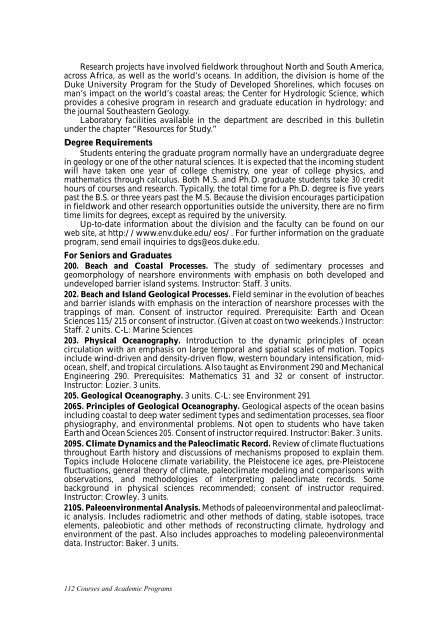Duke University 2003-2004 - Office of the Registrar - Duke University
Duke University 2003-2004 - Office of the Registrar - Duke University
Duke University 2003-2004 - Office of the Registrar - Duke University
Create successful ePaper yourself
Turn your PDF publications into a flip-book with our unique Google optimized e-Paper software.
Research projects have involved fieldwork throughout North and South America,<br />
across Africa, as well as <strong>the</strong> world’s oceans. In addition, <strong>the</strong> division is home <strong>of</strong> <strong>the</strong><br />
<strong>Duke</strong> <strong>University</strong> Program for <strong>the</strong> Study <strong>of</strong> Developed Shorelines, which focuses on<br />
man’s impact on <strong>the</strong> world’s coastal areas; <strong>the</strong> Center for Hydrologic Science, which<br />
provides a cohesive program in research and graduate education in hydrology; and<br />
<strong>the</strong> journal Sou<strong>the</strong>astern Geology.<br />
Laboratory facilities available in <strong>the</strong> department are described in this bulletin<br />
under <strong>the</strong> chapter “Resources for Study.”<br />
Degree Requirements<br />
Students entering <strong>the</strong> graduate program normally have an undergraduate degree<br />
in geology or one <strong>of</strong> <strong>the</strong> o<strong>the</strong>r natural sciences. It is expected that <strong>the</strong> incoming student<br />
will have taken one year <strong>of</strong> college chemistry, one year <strong>of</strong> college physics, and<br />
ma<strong>the</strong>matics through calculus. Both M.S. and Ph.D. graduate students take 30 credit<br />
hours <strong>of</strong> courses and research. Typically, <strong>the</strong> total time for a Ph.D. degree is five years<br />
past <strong>the</strong> B.S. or three years past <strong>the</strong> M.S. Because <strong>the</strong> division encourages participation<br />
in fieldwork and o<strong>the</strong>r research opportunities outside <strong>the</strong> university, <strong>the</strong>re are no firm<br />
time limits for degrees, except as required by <strong>the</strong> university.<br />
Up-to-date information about <strong>the</strong> division and <strong>the</strong> faculty can be found on our<br />
web site, at http://www.env.duke.edu/eos/. For fur<strong>the</strong>r information on <strong>the</strong> graduate<br />
program, send email inquiries to dgs@eos.duke.edu.<br />
For Seniors and Graduates<br />
200. Beach and Coastal Processes. The study <strong>of</strong> sedimentary processes and<br />
geomorphology <strong>of</strong> nearshore environments with emphasis on both developed and<br />
undeveloped barrier island systems. Instructor: Staff. 3 units.<br />
202. Beach and Island Geological Processes. Field seminar in <strong>the</strong> evolution <strong>of</strong> beaches<br />
and barrier islands with emphasis on <strong>the</strong> interaction <strong>of</strong> nearshore processes with <strong>the</strong><br />
trappings <strong>of</strong> man. Consent <strong>of</strong> instructor required. Prerequisite: Earth and Ocean<br />
Sciences 115/215 or consent <strong>of</strong> instructor. (Given at coast on two weekends.) Instructor:<br />
Staff. 2 units. C-L: Marine Sciences<br />
203. Physical Oceanography. Introduction to <strong>the</strong> dynamic principles <strong>of</strong> ocean<br />
circulation with an emphasis on large temporal and spatial scales <strong>of</strong> motion. Topics<br />
include wind-driven and density-driven flow, western boundary intensification, midocean,<br />
shelf, and tropical circulations. Also taught as Environment 290 and Mechanical<br />
Engineering 290. Prerequisites: Ma<strong>the</strong>matics 31 and 32 or consent <strong>of</strong> instructor.<br />
Instructor: Lozier. 3 units.<br />
205. Geological Oceanography. 3 units. C-L: see Environment 291<br />
206S. Principles <strong>of</strong> Geological Oceanography. Geological aspects <strong>of</strong> <strong>the</strong> ocean basins<br />
including coastal to deep water sediment types and sedimentation processes, sea floor<br />
physiography, and environmental problems. Not open to students who have taken<br />
Earth and Ocean Sciences 205. Consent <strong>of</strong> instructor required. Instructor: Baker. 3 units.<br />
209S. Climate Dynamics and <strong>the</strong> Paleoclimatic Record. Review <strong>of</strong> climate fluctuations<br />
throughout Earth history and discussions <strong>of</strong> mechanisms proposed to explain <strong>the</strong>m.<br />
Topics include Holocene climate variability, <strong>the</strong> Pleistocene ice ages, pre-Pleistocene<br />
fluctuations, general <strong>the</strong>ory <strong>of</strong> climate, paleoclimate modeling and comparisons with<br />
observations, and methodologies <strong>of</strong> interpreting paleoclimate records. Some<br />
background in physical sciences recommended; consent <strong>of</strong> instructor required.<br />
Instructor: Crowley. 3 units.<br />
210S. Paleoenvironmental Analysis. Methods <strong>of</strong> paleoenvironmental and paleoclimatic<br />
analysis. Includes radiometric and o<strong>the</strong>r methods <strong>of</strong> dating, stable isotopes, trace<br />
elements, paleobiotic and o<strong>the</strong>r methods <strong>of</strong> reconstructing climate, hydrology and<br />
environment <strong>of</strong> <strong>the</strong> past. Also includes approaches to modeling paleoenvironmental<br />
data. Instructor: Baker. 3 units.<br />
112 Courses and Academic Programs









